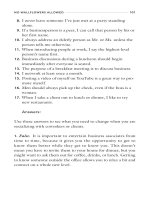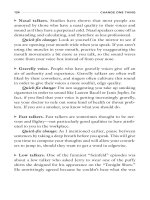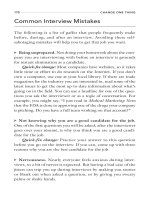Change One Thing Discover Whats Holding You Back and Fix It With the Secrets of a Top Executive Image Consultant_4 pdf
Bạn đang xem bản rút gọn của tài liệu. Xem và tải ngay bản đầy đủ của tài liệu tại đây (386.13 KB, 23 trang )
78
CHANGE ONE THING
applies to you. Smokers, although banned from indulging in the
office, still carry the smell of smoke long after they have come
back from their break. If you must smoke, do it outside where
your clothes can air out as much as possible, or have a “smok-
ing jacket,” an article of clothing that you wear while smoking
and leave in the closet afterward. And go easy on the fragrances.
Many people are allergic to perfume, cologne, and aftershave, so
wearing too much, which means the fragrance hangs in the air
long after you’ve left the room, will make people want to strap
on an oxygen mask.
3. You talk too loudly on the phone. Unless you have a private
office, use your indoor voice when talking on the phone. This
is one of the complaints I hear most often from office workers,
especially those who are sitting side by side in cubicles.
4. You goof off too much. Everyone goofs off now and then,
which is fine and actually good for recharging the batteries.
Companies like Google encourage letting off steam by having
basketball courts and Ping Pong tables at the office, because
they know that workers will stay at the office longer when they
are having fun. But if you are missing deadlines and are more
of an online poker player than a team player, your colleagues
(and supervisors) will soon tire of your all-play-and-no-work
attitude.
5. You’re a brownnoser. While it’s important to stay in the good
graces of your boss, kissing up to the supervisor is not only irri-
tating, it’s also counterproductive. Business leaders don’t need
or want people who agree with everything they say, because they
are not always right. Having an original thought and coming up
WHAT KIND OF COLLEAGUE ARE YOU?
79
with new and better ideas is far better for the company. Staying
later than everyone else on your team so you can e-mail the boss
with a time stamp to give the impression that you were last man
or woman standing is another example of a grandstanding ploy
that will backfire. Remember, it is just as important to be con-
sidered a team player and to have the respect of your colleagues
as it is to be the apple of your supervisor’s eye.
6. You are always late. Everyone is late once in a while, whether
it’s the result of being caught behind a slow-moving truck, being
delayed by a sick passenger on the train, or having a child miss
the school bus. But chronically late people who are constantly
coming up with excuses for their tardiness or simply waltzing
into work well past the expected arrival time show that they
just don’t care enough about their job. Johnny- and Jane-come-
latelies need to set their alarm clocks twenty minutes ahead to
give themselves some wiggle room, should unforeseen circum-
stances arise. It’s less stressful for everyone, including you. Suc-
cessful folks manage their time; time does not manage them.
7. You’re unprepared. Unless you work for yourself, you must
be a team player, which means you are required to do whatever
is necessary to hold up your end. Just because you cheated off
of someone else’s paper when you were in college doesn’t mean
you should depend on others to do your work for you. Being
unprepared at a meeting is embarrassing for you and, ultimately,
reflects badly on the entire company.
8. You’re a blamer. There is always someone who believes or
pretends that he or she is never wrong. These annoying people
are continually looking for scapegoats and covering their tracks
80
CHANGE ONE THING
so they appear to have a spotless record. If you have a tendency
to point the finger at others when you make a mistake, you will
eventually lose all credibility and be universally despised. Every-
one makes mistakes, so own up to it by learning from them and
saying, “My bad, but it won’t happen again.”
9. You’re two-faced. If you smile and act friendly to someone’s
face and then turn around and bad-mouth the person to others
behind his or her back, then you are the classic two-face. You
probably don’t even realize you are doing it, which makes this
bad work habit one of the most insidious. If you have a beef with
someone you work with, see that person privately, and air out
your differences. Pretending to form an alliance with someone
when you want nothing more than to bring the person down is
behavior worthy of a cheesy reality show—and doesn’t belong in
the workplace.
10. You’re an office squatter. This far less nefarious but equally
annoying habit involves taking up residence in a coworker’s
office and overstaying your welcome. A simple way to correct
this problem is to ask, “Are you busy?” or, “Do you have some
time to chat?” before you sit down. It gives people an opportu-
nity to say they can’t talk now but will call you later when they
are free. Some people are too polite to ask you to scram.
11. You’re a Drama Queen. Drama Queens know no gender or
sexual orientation. They thrive in a crisis, real or imagined, and
turn the smallest infraction into a meltdown. Everything must
revolve around them, or else they will manufacture a reason
to be the center of attention. If this sounds like you, heed the
advice of any savvy elementary-school kid, and save the drama
for your mama!
WHAT KIND OF COLLEAGUE ARE YOU?
81
When It’s Time to Change Jobs
Despite our best efforts to change situations for the better,
sometimes the best way to save our health and sanity is to quit.
If the economy is in the Dumpster, you might have to wait for
an uptick, but that doesn’t mean you can’t start polishing up
your résumé.
How do you know when the time has come to go? Take
an inventory of your misery index in order to determine if you
should rev up your job search engines. Unless you have some
kind of financial cushion, do not quit until you get another
job. Here are some signs that it’s time to pull out the interview
suit:
You get sick to your stomach every Sunday.
Y
If you continu-
ally feel nauseated on Sunday evening just thinking about going
back to work, start putting out feelers for another job. Your
physical and mental well-being is more important than your
career, and being in a constant state of stress can be hazardous
to your health.
The work environment is toxic.
Y
Has the morale at your
office hit rock bottom? Does everyone walk on eggshells because
the boss is a sadistic screamer? Are coworkers so obnoxious or
evil that you are taking breaks every fifteen minutes in order to
breathe the precious air of freedom? Toxic work environments
can be tolerated for short periods, but eventually everyone will
go belly up if they stay too long. If you are being harassed sexu-
ally or psychologically, report the offenders to human resources
immediately. You might get a settlement to take with you on
your way out the door.
82
CHANGE ONE THING
You’re doing the work of ten people.
Y
With the increased
numbers of layoffs, companies are depending on workers who
remain to pick up the slack for downsized employees for no
additional money. According to CareerBuilder.com, 68 percent
of workers feel burnout at work, and 45 percent describe their
workloads as too heavy. If all you have the energy to do when
you get home is watch back-to-back TV shows with a micro-
waved dinner, it’s time to send out your résumé.
It’s been years since your last raise or promotion.
Y
If five or
ten years have passed without a change in the numbers in your
paycheck and you’ve been working your heart out, doing a great
job, and have asked for a raise several times to no avail, you are
not being respected at work. The same goes for a promotion and
title bump, which can increase your value in the marketplace
even if you are being undervalued financially at your current
position. Loyalty is not always rewarded these days, so get out
there and see what you are really worth!
You are being shut out.
Y
Are you being left out of important
meetings? Missing the memos that are being circulated to peo-
ple on your team? Are you never asked to join your coworkers
for lunch? It’s not hard to see when you are being shut out, and
that’s a major red flag that you are being set up for a fall.
You are about to be laid off.
Y
By the time you hear rumors
that the company is going to be downsizing or is about to out-
source your job to India, it’s probably true. Get on the horn, fire
out some e-mails, and start networking for another job.
You’re bored.
Y
While there are worse things in life than being
bored, consider that you are spending forty hours a week at
WHAT KIND OF COLLEAGUE ARE YOU?
83
work, which is a lot of time if you are clock-watching or check-
ing YouTube and blogs for the latest post. You don’t necessarily
have to quit, but you might want to change something about
your job to make it more challenging and interesting. Ask your
boss if you can take on more responsibility or learn a new skill at
a local college.
Career Change Caveats
If you decide it’s time to change gears by changing careers,
remember to look around before you leap. Unless you are inde-
pendently wealthy or have enough of a nest egg to support your-
self during the search process, don’t quit before you have a solid
offer. As miserable as you might feel now, knowing that you are
actively networking, scouring job sites, registering with recruit-
ers, and doing your research (including reading books like this
one) should make you feel better. Here are some other caveats to
keep in mind during your job search:
Don’t take the first available job.
Y
When your job misery
index is high, you might be tempted to grab the first opening
you find. Make sure that you investigate the new position by
talking to people who currently work at the company you are
interviewing with and those who have worked there in the past.
The last thing you want to do is to move from one bad job to
another.
Don’t be afraid to change fields.
Y
Sure, it’s scary to go in a
completely new direction after spending years in your current
field, but you will never be fulfilled in your career if you stay
84
CHANGE ONE THING
FASTEST-GROWING CAREERS
Y YYY
Whether you are considering a job change or just starting out,
here’s some information that might help guide your choices.
The following are the five fastest-growing careers, according
to the latest U.S. Bureau of Labor Statistics projections, which
appeared in Newsday:
Personal and home-care aides
2006 employment: 767,000
2016 projection: 1,156,000
Salary: $21,220 or less
Network systems and data communications analysts
2006 employment: 262,000
2016 projection: 402,000
Salary: $46,360 and up
Veterinarians
2006 employment: 62,000
2016 projection: 84,000
Salary: $46,360 and up
Skin-care specialists
2006 employment: 38,000
2016 projection: 51,000
Salary range: $21,260–$30,560
Makeup artists, theatrical, and performance
2006 employment: 2,000
2016 projection: 3,000
Salary: $30,630–$46,300
WHAT KIND OF COLLEAGUE ARE YOU?
85
in an industry that you dislike or are thoroughly bored with.
I know it’s not easy, and it will take some time to navigate the
learning curve, but sometimes shaking things up is necessary.
Don’t necessarily go with the highest bidder.
Y
While money
is certainly a factor in choosing a job, it shouldn’t be your only
consideration. You can’t put a price on job satisfaction, so if a big
paycheck also means working late every night and on weekends
and you would like to spend some more time with your kids,
you might want to trade the money for your life.
Don’t go back to school until you know what you want to
Y
do next. My coauthor, Jodie, knew someone who wanted to
change her career from a medical journalist to a doctor. She quit
her job and was accepted to Harvard, where she needed to take
pre-med courses before going to the med school. Several years
and tens of thousands of dollars later, she decided dissecting
cadavers wasn’t for her. Now she has school loans to repay, and
she’s back to doing medical writing. The moral of this story is,
don’t invest your time and money in tuition before you are abso-
lutely sure about what you want to do next. You can always start
by volunteering or doing an internship in a new field so you can
get some on-the-job experience first.
Do You Have a Negative Work Image?
Is something that is going on at work giving you a negative work
image? If so, it’s time to change whatever is holding you back, so
you don’t risk being on the short list for layoffs. Here are some
86
CHANGE ONE THING
common office obstacles, as well as strategies for breaking down
those barriers to success:
You don’t get enough face time with the boss.
Y
Do you see
your boss only during group meetings or while washing your
hands in the rest room?
Having too little face time with the boss
can be disastrous for your career, because being “what’s-her-
face” means you are a persona non grata at your company.
Quick‑fix change: It’s OK to ask for meetings with your boss
to discuss what you are doing at work and to ask questions if you
need guidance. If your supervisor is too busy for an office chat,
send a memo or e-mail with a status report and a note saying you
are available to discuss the issue at his or her convenience. Mak-
ing small talk in the elevator also is a good way to open up the
lines of communication.
You’re the new kid on the block.
Y
Being a newbie is difficult,
because you are not yet comfortable with the corporate culture
or office politics. There’s a learning curve for all new employees,
so it will take some time before you earn the trust and confi-
dence of your coworkers and are considered one of the gang.
Quick‑fix change: After figuring out where the supply room
is, try to learn everyone’s name and title. Don’t be afraid to ask
questions if you don’t know something, and try to find a person
who will mentor you until you get the hang of things. Invite a
coworker out of lunch to pick his or her brain and get the inside
scoop on who’s the shark and who’s the starfish.
Your work area is a mess.
Y
Not everyone is organized by
nature, but if you have a filing system that only you can under-
stand, the next time you are out sick and someone is trying to
WHAT KIND OF COLLEAGUE ARE YOU?
87
find an important document on your mile-high pile, you will be
cursed by your coworkers.
Quick‑fix change: Instead of being known as the office slob,
take time at the end of each work day to organize your work-
space or office. Make use of files, folders, boxes, or binders that
are clearly marked so others can identify them as well. In these
increasingly paperless times, do the same for your computer files.
Make folders and put labeled documents in them, so others can
retrieve them easily.
You work alone most of the time.
Y
Some jobs involve hours
spent alone in front of a computer or assignments that don’t
require working as a team. If you are one of those people who fly
solo at work, you are missing out on the camaraderie of cowork-
ers and, even worse, are likely to be forgotten or passed over for
raises or promotions.
Quick‑fix change: Request to be included on the next group
project, or ask for someone to bounce your ideas off of. If there
is no opportunity to join forces in your day-to-day job, join the
softball team or some other after-work activity where you have a
chance to mix and mingle.
Nobody listens to you.
Y
Are your ideas not being heard or
respected? Do you feel as though you know exactly how to fix a
problem at work but no one is listening?
Quick‑fix change: Some people speak more forcefully than
others, which is why the meek are unlikely to inherit the com-
pany. Practice being more assertive (without being aggressive)
by following up if you are not being heard. Use the power words
listed in the communication chapter (Chapter 6), make eye con-
tact when you are presenting an idea, and be persistent without
being a pest.
88
CHANGE ONE THING
Little White Lies That Backfire
No one is 100 percent honest all of the time, especially in the
workplace. Besides, it’s not always to our advantage to tell the
truth when a little white lie might help us save time, save face,
or save our necks. That said, there are times when honesty is the
best business policy, such as when you are asked the following
questions:
Do you have any questions?
Y
If you are unsure about an
assignment or task and are asked if you have any questions, do
not be afraid to speak up. While, contrary to popular belief,
there is such a thing as a stupid question, it is better to ask than
to try muddling through in the dark.
Can you do this for me?
Y
When a deadline is approaching
and a boss or coworker asks you if you can take on more work,
do not say, “Sure, no problem,” when you want to say, “Are
you kidding me?” Politely but firmly say, “I’m sorry, but I’m on
deadline, and I’m up to my ears already. Maybe [insert coworker’s
name] can help.” You can also tell the person asking you for help
that you will see if your deadline can be moved. If not, you will
at least get points for trying.
Why were you late?
Y
Everyone is late once in a while, so resist
the temptation to make up a story like “My alarm didn’t go off”
or “My kid got sick this morning,” if you lost track of time. A
simple “Sorry” before getting right down to work will suffice.
Are you sick?
Y
Do not come to work when you are sick! Sneez-
ing, wheezing, and coughing all over your coworkers is not only
WHAT KIND OF COLLEAGUE ARE YOU?
89
annoying, it will spread your germs. Don’t be a martyr; stay in
bed until you are better.
Are you almost finished with the project?
Y
Do not say you
are on schedule with a project if you haven’t started it yet or if
you know for certain that you will need at least another day to
finish. Let your supervisor know that you are running behind,
so he or she can either get you some help or push the deadline
back if possible.
Use Your Annual Review as an
Instrument for Change
Many workers fear their annual review because they feel they
must defend their performance when criticized. Try not to look
at your review as a trial by fire. Instead, look at it as an oppor-
tunity to make your case for a promotion or raise. Keep a list of
your achievements, including the date performed and how each
achievement directly or indirectly helped the company’s bottom
line. Bring that list with you to the review, so you are well armed
to present documented instances where you have gone above
and beyond your job description. Job reviews also give you a
chance to let your supervisor know what your goals are, includ-
ing educational opportunities that the company might be will-
ing to finance.
Here are some other ways you can prepare for your review:
Review your job description.
Y
Go over the job description
given to you by the human resources department, so you are
reminded of everything you are supposed to do.
90
CHANGE ONE THING
Do a self-review.
Y
Many managers will ask you to critique
your strengths and weaknesses, so be prepared to come up with
examples of both. As in a job interview, you should select a
weakness that can be overcome and be ready with solutions for
how to improve. Refer to your success journal to document your
achievements over the past year.
Tie up any loose ends.
Y
If you have a project that is still unfin-
ished, try to complete it before your review. If that isn’t possible,
select projects that you completed successfully in the past to use
as examples of how you saw something through from start to
finish.
Do not lie or cover up mistakes.
Y
Any boss worth his or her
salt is well aware of employee gaffes, so don’t try to cover up your
past mistakes. Own up to them, and explain what you learned
from the experience and how you think similar mistakes could
be avoided in the future.
Take notes.
Y
Take copious notes on what your supervisor
is saying, so you can refer to them in the future. You should
also take a list of talking points that you would like to discuss
after you have patiently listened to your boss and recorded the
feedback.
Review the reviewer.
Y
Annual reviews can swing both ways.
They give you a chance to voice your opinions on how you think
your department or company could improve, or ways that your
boss could help make your job easier. This is not the place for a
gripe session, so make sure your critiques are couched in posi-
tive way. For example, you could say, “I know you are busy with
department head meetings, but it would be helpful if I could
WHAT KIND OF COLLEAGUE ARE YOU?
91
meet with you briefly once a week to give you a status report on
the project I’m working on.”
Are You a Bad Boss?
Many bosses are not aware of their failings. They might be
good at giving job reviews to the people they manage, but not
as good at asking, “How am I doing?” Knowing what the peo-
ple you supervise think of your managerial skills can make you
a better boss and make your team happier and more loyal. In
Shakespeare’s portrayal of the heroic Henry V of England, the
king went undercover as one of his soldiers in order to see what
his men really thought about his leadership skills. His band of
happy warriors went on to win the battle against France. Need
I say more?
Here are some bad boss behaviors to look out for:
You treat your assistant like a servant.
Y
In the bestselling
roman à clef The Devil Wears Prada, the evil editor of a power-
ful fashion magazine expected her assistant to hang up her coat,
fetch her food and snacks, and run personal errands for her 24/7.
While we understand that young up-and-comers must pay their
dues, treating someone like a servant will engender untold anger
and resentment that will spread like a viral video throughout the
company. Plus, your poor indentured assistant will probably last
only a few months before tiring of your imperious behavior, and
training new people takes time and energy away from your work.
You never say, “Good job!
Y
” Bosses whose parents never told
them they were proud of them after a job well done are often
92
CHANGE ONE THING
doomed to pass along this tough-love MO when they are at the
helm. It’s fine to have high expectations, but when you only
punish the bad without ever rewarding the good, you will have
disaffected and resentful underlings. Being overly critical also
puts the kibosh on creativity or initiative, because people live in
fear of making mistakes. Try to remember to give credit for a job
well done, so you don’t break the spirits of those around you.
Only a sadist enjoys watching employees collapse in a puddle of
tears.
THE LATEST UN-NETWORKING TREND
Y YYY
I talk a lot about networking, which is essential for any busi-
nessperson, but if you’re under 40 and work in a nontradi-
tional or creative field like technology, design, advertising, or
art, you might want to try something called Likemind instead.
Many young professionals who don’t wear suits to work are
replacing the old-school shake-and-make for casual chat-
and-chews at a local coffee house. These gatherings involve
brainstorming, relationship building, and partner hunting
and are taking place each month in fifty-five cities around the
world, including, São Paulo, Shanghai, and Melbourne. They
are the equivalent to the “unconference”—those unconven-
tional, mostly geeky gatherings that have tried to replace
the luxury-hotel executive retreat of the past. If there isn’t a
Likemind group in your town or city, start one up! For more
information on Likemind networking groups in your area, go
to www.likemind.us.
WHAT KIND OF COLLEAGUE ARE YOU?
93
You’re a screamer.
Y
While yelling might help you let off some
steam, it is downright humiliating to be on the receiving end of
a tirade. If you are a screamer, take a break to calm down before
dressing down the person at fault, or take an anger management
course if taking deep breaths and counting to twenty don’t do
the trick.
You don’t give instructions.
Y
When managers are busy, they
don’t always want to take the time to give explicit directions
about what they want their staff to do. Don’t expect people to
read your mind. Taking a few minutes to calmly explain what
you want people to accomplish will save you time in the long
run, because you won’t have to go back and fix mistakes.
You hog all the credit.
Y
It might sound like a cliché, but if you
surround yourself with people who are as smart as or smarter
than you are, you will end up looking like a genius, or at least
someone who knows how to pick talent. But what’s important
is that you make sure those people get credit for their ideas and
successes. Otherwise, they won’t stick around long.
Networking Exercise: Your Thirty-
to Sixty-Second Commercial
When you are networking, it is absolutely crucial that you be
able to introduce yourself and explain what you do in thirty to
sixty seconds. These self-promotional sound bites will let people
know who you are and what you can do for them or for their
business, which is the purpose of any networking situation or
94
CHANGE ONE THING
event. Fill in the following worksheet to help formulate your
commercial.
My name is .
The company I work for is .
My title is .
My latest product/service/program is
.
My customers or clients are
.
What need or problem does your business address?
.
How does your business or service work?
.
What distinguishes you from others?
.
I/my company have/has won awards and
citations.
My accomplishments include
.
WHAT KIND OF COLLEAGUE ARE YOU?
95
What Not to Talk About at
a Networking Event
Certain subjects are off-limits at networking events. Remember,
you are not there to meet your soul mate; you are there to get a
job or recommendation. Here are some topics to avoid:
Religion.
Y
People’s spiritual beliefs are extremely personal,
so don’t risk saying something that might offend someone by
talking about religion. This includes such controversial topics as
intelligent design, cloning, abortion, stem cell research, and gay
marriage. Wars have been started over less.
Politics.
Y
While politics can be a fun topic to discuss among
friends, stay away from political issues with people you’ve just
met. As with religion, people take their political opinions quite
seriously, so a pleasant conversation can easily turn ugly when
people start making political statements. In a recent poll of users
of Monster, a career search website, more than 26,000 respon-
dents said that when it comes to talking politics with coworkers,
“don’t ask, don’t tell” is the best policy. Forty-six percent said
the best way to deal with political discussions is to “listen, but
keep your opinions to yourself.” I agree 100 percent.
Diet.
Y
People who have weight issues, whether they are over-
weight or anorexic, tend to be sensitive about their size, so don’t
volunteer the fact that you lost twenty-five pounds on a grape-
fruit diet. Unless someone asks you how you stay so fit, don’t
talk about diets or food regimens with people you don’t already
know well.
96
CHANGE ONE THING
Money.
Y
Many of us were taught by our parents that it is impo-
lite to talk about money. This rule holds true in networking situ-
ations. If someone compliments you about an item of clothing
or jewelry, do not say, “Oh, I got this thing at a yard sale,” or
“Thank you; it cost me $200, which I thought was a bargain.”
Don’t attach a monetary value to things, lest you appear materi-
alistic or parsimonious.
Illness.
Y
Networking events are not the place to discuss ill-
nesses, so avoid this topic like the, um, plague. No one wants to
hear about your colonoscopy over cocktails and hors d’oeuvres.
Marital status.
Y
Keep in mind that you are at a business
event, not a singles mixer, so do not ask if a person is married.
Women, especially, will feel uncomfortable if this is raised by
men, because they won’t know whether or not they are being hit
on. If a person mentions his or her spouse, then you can discuss
the topic, if you wish.
Work gossip.
Y
Don’t spread rumors about people or internal
company information. You shouldn’t do this as a general rule,
because gossip reflects badly on the person who’s spreading it,
and you don’t want to be thought of as someone who can’t be
confided in or trusted.
Anna’s Better Networking Tips
Here are a few of my favorite techniques, guaranteed to make
any networking event work for you:
WHAT KIND OF COLLEAGUE ARE YOU?
97
Come prepared with conversation starters.
Y
You should have
an opening line or two that will serve as an icebreaker when
you approach someone you are meeting for the first time. Ice-
breakers include “How did you hear about this event?” The way
people respond will give you an idea of whether or not they are
open to a conversation with you.
Look for a threesome.
Y
If you don’t know anyone, start by
joining a group of three or more. Two people talking together
might be engaged in a private conversation that they don’t want
interrupted. You can also approach the host of the event, who
will introduce you to others, or simply someone with a friendly
face.
Don’t be afraid of small talk.
Y
Suggested topics of conversa-
tion at parties and networking events include your latest travel
adventures, recommendations for good local restaurants, mov-
ies that you enjoyed, good books that you’ve read, sports, the
latest technological gadget or breakthrough, and current events,
if positive.
Know what you are looking for before you start.
Y
It’s a waste
of your time and others’ if you go to a networking event before
you know what kinds of jobs or companies you are looking for.
Take time to do the exercises and take the quizzes in this book if
you are not sure about what your next step should be.
Do your research.
Y
Most people like to help, but they get
weary when they are asked questions that can be answered by
a simple Google search. Do your research before you start net-
working, so you sound informed.
98
CHANGE ONE THING
Don’t act desperate.
Y
As hard as times might be, don’t let on
that your next mortgage payment depends on your getting a job
yesterday. As when you’re dating, people don’t want to be with
(or hire) anyone who sounds or acts desperate.
Don’t do all the talking.
Y
When networking with someone
who can help you with leads to a job, make sure you are not the
one doing all the talking. While it’s important to let your men-
tor know about your skills, qualifications, and goals, the reason
you are there is to gather as much information as possible from
others.
Don’t overstay your welcome.
Y
Sure, people like to help oth-
ers in need, which is what mentors do when they take you under
their wing, but don’t take advantage of their largesse by calling
or e-mailing them every day with questions.
Ask before you name-drop.
Y
Before you use the name of a
contact you chatted up at a networking event, be sure you have
gotten their permission to do so, or your name- dropping will
come back to haunt you.
Don’t come on too strong.
Y
While it’s great to project confi-
dence in yourself and your expertise, be careful not to come on
too strong while networking. There is a happy medium between
self-assurance and shameless self-promotion—and the latter will
often make the other party uncomfortable.
Don’t forget the thank-you note.
Y
Good networkers remem-
ber to thank the people who help them, so send a follow-up
e-mail or note to the person you met, reminding him or her of
your conversation and, above all, expressing thanks for his or
her time and support.
99
5
NO WALLFLOWERS
ALLOWED
Change One Thing About
Your Social Image
We a r e n o T
YY
born knowing the right thing to say, the right
thing to wear, and the right way to behave. That knowledge
starts with our parents, who teach us how to talk, share, and
become good citizens of the world. Understanding proper eti-
quette is not just about what fork to use or about what to wear at
a function. It’s about making other people around you feel more
comfortable.
What would you do if you were out at dinner party, for
example, and the person next to you took your water glass by
mistake? Would you turn to that person and say, “Hey, that’s
my water glass,” or would you discreetly call the waiter over and
say, “May I have another water glass, please”? Many people are
afraid of making a social faux pas but do not realize that making
100
CHANGE ONE THING
others feel bad is the ultimate in bad form—far worse, and more
common, than bad table manners. In contrast, when you do
something nice for someone else, I guarantee that your kindness
will be remembered. Whether that person is a business colleague
or personal acquaintance, every kind act is an emotional deposit
in the person that you can draw from in the future.
When it comes to socializing with coworkers or clients,
knowing the proper protocol is even more difficult. Whom do
you introduce first? When is it OK to give out your business
card? Should you call the CEO by his or her first name? Do you
clam up when more than two people are in a room?
The following business protocol quiz will tell you how much
you know about business protocol, and the answers will help
you shine like a polished professional whenever you mix business
with pleasure.
ANSWER TRUE OR FALSE:
YY
1. Meeting with my clients socially is not necessary, because
they know I am a busy person.
2. I know the difference between playing at a public golf
course and at a country club.
3. When I’m traveling on business to a foreign country, I am
aware of other people’s cultural differences.
4. I always carry business cards.
5. I never offer a business card unless I am asked for one.
6. I always keep my right hand free to shake hands at a busi-
ness function.
7. I never go back to the buffet table more than once at a
business function.









